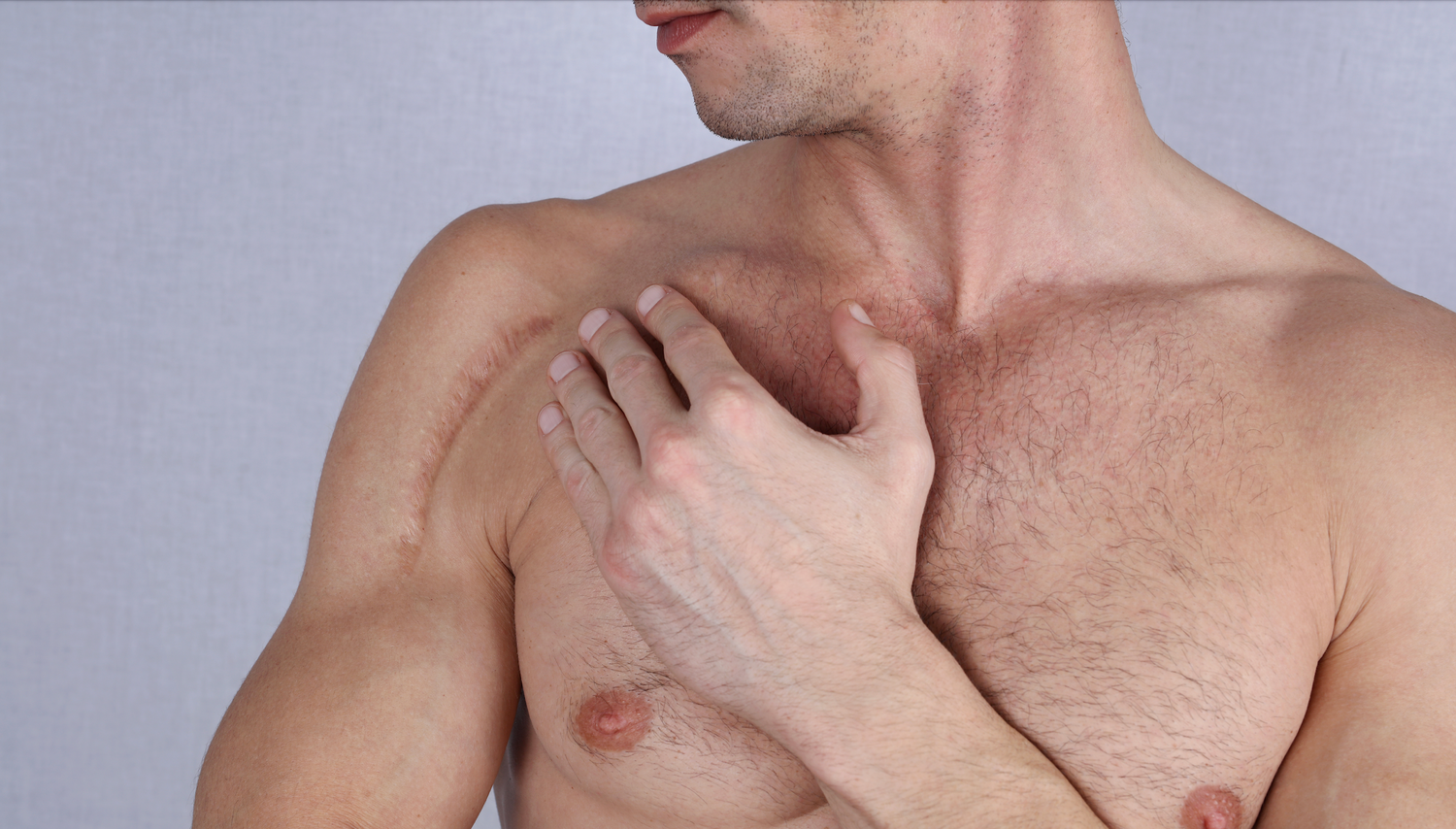You know that feeling when you're staring at a fresh surgical scar? That mix of relief that the procedure went well… but also wondering what your skin will look like months from now. I get it. You're not looking for another complicated skincare routine—you just want something that actually works without taking over your life.
Here's the thing about finding the right scar care approach: timing matters, but so does finding solutions that fit into your real world. No one has time for hour-long scar care rituals, and frankly, you shouldn't need them.
Why Most Post-Surgery Scar Care Gets Complicated (And How to Keep It Simple)
After surgery, your skin goes through this incredible healing process that takes 12-18 months to complete [1]. During this time, your body's laying down new collagen and remodeling tissue. The catch? Without the right support, this process can lead to raised, discolored, or overly thick scars.
This is where quality scar care products make their biggest impact. Nuvadermis silicone-based solutions work by creating the optimal environment for your skin to remodel itself naturally. Think of it like… giving your skin the perfect conditions to do what it already knows how to do.
Here's what actually happens when you use silicone products consistently:
-
Your scar stays hydrated (which helps prevent excessive collagen production)
-
The area gets gentle, consistent pressure that guides tissue remodeling
-
Inflammation reduces naturally over time
-
Your skin gradually restores its normal texture and tone
The beauty of this approach? It works with your body's natural healing timeline rather than against it.
The Science-Backed Approach: What Actually Works for Surgical Scar Improvement
Let's cut through the marketing noise. When it comes to effective post-surgical scar care, silicone consistently comes out on top in clinical studies [1]. But not all silicone products are created equal—and understanding your options helps you choose what works best for your specific situation.
Silicone Sheets: Your 24/7 Scar Support System
Medical-grade silicone sheets are like having a dedicated environment for optimal skin restoration working around the clock. They're particularly effective for:
-
C-section scars
-
Joint replacement incisions
-
Mastectomy scars
-
Any straight-line surgical incision
The beauty of silicone sheets? You apply them once daily and forget about them. Studies show you need 12-24 hours of wear time daily, but modern sheets are comfortable enough to sleep in [2].
For new scars, you'll typically see improvements within 6-8 weeks [3]. Older scars take more patience—around 4-6 months of consistent use.
Advanced Scar Gels: For Areas Sheets Can't Reach
Sometimes sheets just aren't practical. Face scars, areas that bend and move, spots where tape won't stick… that's where advanced scar gels shine.
Look for formulations that combine silicone with ingredients like:
-
Retinol: Helps with skin cell turnover and texture improvement
-
Allantoin: Reduces irritation and supports gentle tissue repair
-
Vitamin E: Provides antioxidant support
These gels absorb quickly and work invisibly under makeup or clothing. Perfect for facial scars or areas where you need discretion. A high-quality silicone gel can make a real difference in both convenience and results.
Surgical Scar Treatment Options That Work: A Practical Ranking
Based on clinical evidence and real-world usability, here's how the most effective options stack up:
1. Medical-Grade Silicone Products (Highly Effective)
Why they work: Create an optimal environment for skin restoration, reduce inflammation, and guide collagen remodeling [6]. Studies consistently show their effectiveness [1].
Best for: All surgical scar types, especially raised or thick scars
Time commitment: Apply once daily, wear 12+ hours
2. Advanced Scar Gel Formulations (Significant Improvement)
Why they work: These combine the benefits of silicone with active ingredients that support skin restoration and texture refinement.
Best for: Facial scars, curved areas, daily-wear situations
Time commitment: 2-3 applications daily
3. Professional Steroid Injections (70-80% improvement)
Why they work: Directly reduce inflammation and break down excess collagen [7]
Best for: Thick, raised scars that haven't responded to topical options
Time commitment: Monthly office visits for several months
4. Laser Resurfacing (60-75% improvement)
Why they work: Remove damaged tissue layers, stimulate new collagen formation [4]
Best for: Mature scars with texture or color issues
Time commitment: Multiple sessions plus recovery time
Creating Your Personal Scar Care Routine (That Actually Works)
The most effective approach isn't necessarily the most complex one. Here's how to build a routine you'll actually stick with, based on where you are in your healing journey:
Week 1-2 Post-Surgery: Keep It Gentle
-
Focus on keeping the area clean and protected
-
Follow your surgeon's specific wound care instructions
-
Once your doctor clears you for scar care products, start with gentle options
-
Consider beginning with silicone gel for sensitive or visible areas
Weeks 3-12: Establish Your Core Routine
This is where consistency becomes everything. Pick one primary method and stick with it:
For busy lifestyles: Silicone sheets applied each evening For visible scars: Advanced scar gel 2-3 times daily For combination approach: Sheets at night, gel during the day
The key here is choosing something you can realistically do every single day. A simple routine you follow consistently beats a complex one you abandon after two weeks.
Month 3 and Beyond: Adjust Based on Results
-
Continue your chosen method for at least 6 months
-
Consider combining approaches if progress stalls
-
Document changes with photos (trust me, you'll forget how far you've come)
-
Be patient—significant improvements often happen between months 6-12
This timeline aligns with your skin's natural healing process, giving you the best chance of meaningful improvement while keeping your routine manageable.
When to Consider Professional Options
Sometimes at-home care isn't enough, and that's okay. Consider professional intervention if:
-
Your scar is getting thicker or more raised over time
-
Color changes are becoming more pronounced rather than fading
-
You're experiencing persistent itching or discomfort
-
The scar is limiting movement or function
-
You haven't seen improvement after 6 months of consistent home care
Recent studies show that combining professional approaches with consistent home care often produces the best results [5]. The key is timing—starting with proven at-home methods gives you a solid foundation, whether you need additional treatment or not.
Setting Realistic Expectations (The Honest Truth)
Let's be real about what scar care can and can't do. You're not going to make your scar disappear completely—that's not how skin works. But you can absolutely:
-
Reduce the appearance of thickness and elevation
-
Improve texture and smoothness significantly
-
Help color differences fade more quickly
-
Prevent the scar from getting worse over time
-
Restore confidence in your skin's appearance
Most people see meaningful improvements within 2-3 months of consistent care, with continued progress for up to 18 months. The earlier you start (once your surgeon gives clearance), the better your results are likely to be.
Remember, every scar is different. Factors like your age, skin type, the type of surgery, and how well you heal all play a role. What matters most is finding an approach that works for your lifestyle and sticking with it.
The Bottom Line on Post-Surgery Scar Care
The best scar care routine is the one you'll actually follow. Whether that's a simple silicone sheet regimen or a more comprehensive approach with multiple products, consistency beats perfection every time.
Start with one evidence-based product, give it time to work, and adjust as needed. Your scar didn't form overnight, and improving its appearance takes patience too. But with the right approach and realistic expectations, you can absolutely help your skin heal in a way that makes you feel confident again.
The good news? You don't need a complicated routine to get results. Sometimes the simplest solutions—like quality silicone products used consistently—are exactly what your skin needs to do its best work.
Ready to find the right solution for your post-surgery scar care? Explore clinically-effective options that fit into real life—because taking care of your skin shouldn't feel like a second job.
Citations
- https://pmc.ncbi.nlm.nih.gov/articles/PMC7949016
- https://health.com/silicone-scar-tapes-7558934
- https://nuvadermis.com/blogs/index/top-5-dermatologist-approved-scar-gels-silicone-strips-2025?srsltid=AfmBOoo3Mkb0WGCDol_p6f1_MCSqALLU27LBfVMGu7GTUPfpmyQscD2r
- https://muschealth.org/medical-services/ent/fprs/scar
- https://plasticsurgery.org/news/articles/an-in-depth-comparison-of-current-surgical-and-nonsurgical-scar-revision-treatments
- https://self.com/story/ask-a-derm-silicone-scar-sheets
- https://nyulangone.org/conditions/scars-keloids/treatments/medical-treatment-for-scars-keloids




